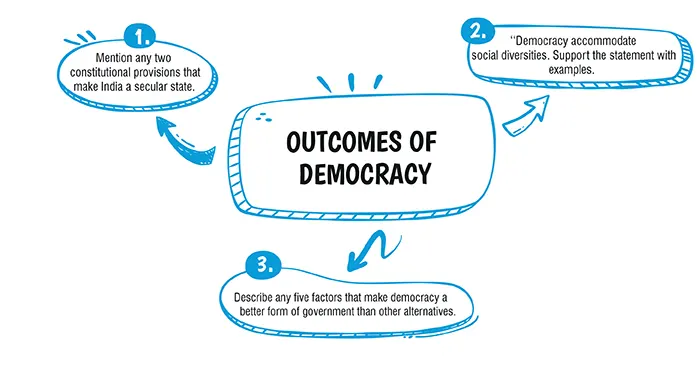Home / Boards / CBSE / Important Questions / Class 10 / Social Science / Outcomes of Democracy
Table of Contents

Ans. (a)
Explanation:
Decisions taken by a democratic government are more likely to be acceptable to the people as they have a say in the decision-making process. On the other hand, in a non-democratic government, decisions are taken by an individual or a group of individuals without any input from the people, which may not be acceptable to the people.
Ans. (d)
Explanation:
Features of Dictatorship: 1. One Party,One Leader and One Programme: Rule of one individual or party. 2. Absence of Individual Liberty 3. National Glorification 4. The glorification of War: Faith in force and war. 5. Totalitarian State
Explanation:
The following constitutional provisions make India a secular state:
(i) There is no official religion for the Indian state.
(ii) The Constitution prohibits discrimination on grounds of religion.
Explanation:
Democracy helps to accommodate social diversities as follows :
(i) Equality is maintained and fair representation is given to all irrespective of their caste, creed, colour etc.
(ii) It ensures that the majority always works in cooperation with the minority.
(iii) It never tries to give undue preference to any one in majority.
(iv) It has better possibilities to handle social differences positively.
(v) Democracy is the best form to resolveconflict because of the independent judiciary.
Explanation:
(i) Democracy produces an accountable government because it provides regular, free and fair elections regularly.
(ii) Open discussions are held on all major issues and legislation, through which public opinion is created.
(iii) Democracy gives its citizens the right to information about the government and its functioning.
(iv) Democracy provides a responsive government as it is formed by elected representatives of the people. The representatives also ensure that the programmes are implemented.
(v) Democracies follow the constitution, this increases the faith of people in the law and the constitution.
| Chapter No. | Chapter Name |
|---|---|
| History | |
| Chapter 1 | The Rise of Nationalism in Europe |
| Chapter 2 | Nationalism in India |
| Chapter 3 | The Making of a Global World |
| Chapter 4 | The Age of Industrialization |
| Chapter 5 | Print Culture and the Modern World |
| Geography | |
| Chapter 6 | Resources and Development |
| Chapter 7 | Forest and Wildlife Resources |
| Chapter 8 | Water Resources |
| Chapter 9 | Agriculture |
| Chapter 10 | Minerals and Energy Resources |
| Chapter 11 | Manufacturing Industries |
| Political Science | |
| Chapter 12 | Power – sharing |
| Chapter 13 | Federalism |
| Chapter 14 | Gender, Religion and Caste |
| Chapter 15 | Political Parties |
| Chapter 16 | Outcomes of Democracy |
| Economics | |
| Chapter 17 | Development |
| Chapter 18 | Sectors of the Indian Economy |
| Chapter 19 | Money and Credit |
| Chapter 20 | Globalization and The Indian Economy |
| Chapter Wise Important Questions for CBSE Board Class 10 Political Science |
|---|
| Power – sharing |
| Federalism |
| Gender, Religion and Caste |
| Political Parties |
| Outcomes of Democracy |
CBSE Important Questions Class 10
ICSE Important Questions Class 10
CBSE Important Questions Class 10
ICSE Important Questions Class 10